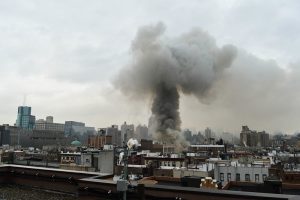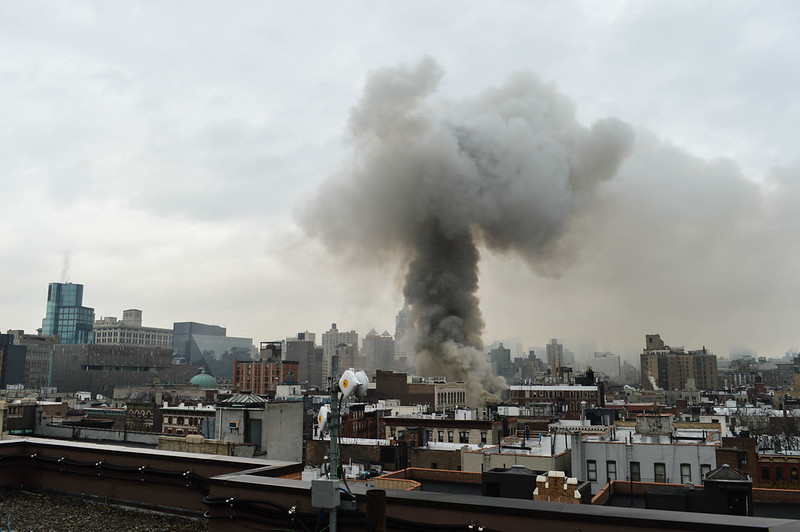I learned two new words today, courtesy of an article linked to from the Positive Deep Adaptation group on Facebook, of which I’m a member. The article is ‘Collapsologie’: Constructing an Idea of How Things Fall Apart.
Apparently French writers have defined ‘Collapsologie’ as the “applied and transdisciplinary science of collapse”. Those who think about collapse and the best ways to adapt to it are ‘Collapsologues’. Personally I see us undergoing more of a long term decline now that our society has peaked in terms of resources and energy (like John Michael Greer’s Long Descent or James Howard Kunstler’s Long Emergency) but it’s good to see more people thinking about it. The article is worth a read:
‘Collapsologie’: Constructing an Idea of How Things Fall Apart

Building Collapse (Image: F. Anzola/Flickr)
Paris—Marco is particularly well-liked among the residents at the retirement home where he works. He attends painstakingly to their every need and discomfort. They confide in him, just as he confides in them. He has painted a collage of bright scenes on the bedroom window of one elderly woman with whom he is particularly close, and with whom he shares a taste in crass humor. As he adds a red rocket ship to the motley tapestry, however, he notices something rustling in the woods down below.
His former co-workers, gone presumably for several days, are carting away the home’s remaining food. When he goes out to stop them, they tell Marco that it’s futile: more supplies will not come, and he’s silly to chain himself to this spot. They tell him where they’re camping that night and that he’s welcome to join. After a moment or two of protest, he goes back inside and tries to pretend as if nothing has changed. But the hopelessness of the situation finally catches up with him. Affixing a respirator to a gas tank unhinged from a utility closet, Marco goes about the thankless task of helping his residents check out early.
So goes the sixth episode of the new French mini-series, L’Effondrement, that premiered this fall on the Canal+ network. Made up of eight stand-alone vignettes, L’Effondrement, or “Collapse,” is set in the near future. This dystopia, as the title suggests, inverts the logic of shows such as the British drama series Black Mirror, which allows viewers to savor their claustrophobic entanglement in a watertight technological apparatus beyond their control. Max Weber’s “iron cage” of modern society’s bureaucratic rationality is not so rigid, L’Effondrement would have us believe. Instead, confronted by the rickety foundations of all we’d taken for granted, we relish the possibility that we might be swept away once everything falls apart.
A global spike in energy prices, frozen industrial supply chains, climate shocks such as crop-destroying heat waves and rapid ecosystem decay—it is not until the series’s final episode, a flashback to the days before the collapse, that we get something of the broader picture. A group of activists, Extinction Rebellion style, have hatched a plot to sneak a rogue climate scientist into a talk show studio where the environment minister is slated to give a reassuring appearance. When the activists rush the stage, the minister graciously allows the scientist to give his rant, after which she dismisses him as an extremist: “You’re a collapsologue!”
For his scruffy beard and frank speaking style, this television scientist is a pretty good stand-in for Pablo Servigne. Disenchanted with the main tenets of conventional environmentalism, Servigne is foremost among a young generation of thinkers, scientists, and activists who call themselves, not without a hint of irony, collapsologues. His first book, the 2015 bestseller co-authored with Raphaël Stevens, Comment tout peut s’effondrer: petit manuel de collapsologie à l’usage des générations présentes (“How everything can collapse: a brief manual of collapsology for present generations”), offered a diagnosis of our “thermal-industrial” civilization and a prognosis of its coming collapse (an English-language edition is forthcoming).
Collapsologie—or, as Servigne and Stevens define it, the “applied and transdisciplinary science of collapse”—proposes to free environmentalist thought from the linear or progressive understanding of history implicit in such faiths as “sustainable development,” “green growth,” or the energy “transition.” The story of human societies, which Servigne and Stevens suggest is ultimately the story of their interactions with their natural environments, is circular. The pendulum of human history swings between moments of our being harmoniously embedded within natural processes and periods of population concentration, political centralization, and an urge to transcend the earth’s resource constraints. We develop economies of scale, agglomerate extractive industry on a grand scale, but ultimately overexploit our natural foundations.
Building off Jared Diamond’s 2005 book Collapse, which focused on these dynamics in primarily pre-modern societies, Servigne and Stevens argue that the same iron law of history applies to our hyper-connected, concentrated, and self-confident industrial society of today. The reasons are manifold—and many will be familiar to readers of recent anglophone environmental bestsellers such as David Wallace-Wells’s The Uninhabitable Earth, arguably a mass-market work of collapsology in its own right.
First, there are what Servigne and Stevens call the earth’s “crossable thresholds.” These concerns make up the majority of what we now think of when we discuss the environmental crisis. These are soft “thresholds” because nothing fundamentally prevents humans from burning the totality of the earth’s stocks of fossil fuels and heating the atmosphere well beyond 1.5 or 2 degrees Celsius—which most scientists now conclude is the red line for averting the worst effects of global warming. That these thresholds are violable does not, however, mean that transgressing them will be any less devastating. As the Intergovernmental Panel on Climate Change’s (IPCC) landmark 2018 study on warming above 1.5 degrees argues, crossing them would spell unquantifiable but devastating damage to biodiversity and the globe’s natural processes, such as oceanic currents. A series of dire feedback loops would kick in: the melting of Arctic permafrost, for example, which would further heat the earth’s atmosphere. What’s worse, many signs suggest that these tipping-points are closer than we previously understood.
Read more: New York Review of Books




